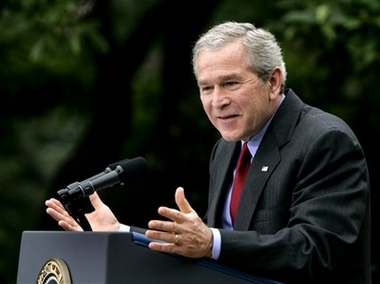President Bush, just back from Iraq, dismissed calls for a U.S. withdrawal as
election-year politics and refused to give a timetable or benchmark for success
that would allow troops to come home.

President Bush speaks during a news
conference, Wednesday, June 14, 2006, in the Rose Garden at the White
House. President Bush, freshly home from a visit to Iraq, acknowledged on
Wednesday that violence in Iraq would never be completely eliminated.
[AP] |
"It's bad policy," Bush said in a Rose Garden news conference Wednesday,
about six hours after he returned from Iraq. "I know it may sound good
politically. It will endanger our country to pull out of Iraq before we
accomplish the mission."
The news conference was arranged to capitalize on Bush's stealthy 5 1/2-hour
trip to Baghdad Tuesday. The visit marked his first meeting with Iraqi Prime
Minister Nouri al-Maliki, and the president said he was impressed with the new
leader's plans and character. "I sense something different happening in Iraq,"
Bush said.
He defended the decision not to tell the prime minister that the U.S.
president was in his country until five minutes before they met and denied that
it was because of any concern about al-Maliki's inner circle.
"I'm a high-value target for some," Bush said. "I think if there was ample
notification that I was coming, perhaps it would have given somebody a chance to
plan, and we just didn't want to take that risk."
Bush said he wanted to see a reduction in the deadly violence in Iraq but
would not say how much it must drop before troops can begin to withdraw. He
offered other ways of measuring progress in Iraq -- an increase in oil
production or more electricity delivered to cool sweltering homes or growing
numbers of Iraqi military units able to handle the fight.
But again, he did not offer any specific targets to measure when Iraqis will
be able to govern themselves. Instead, he declared that the government must be
able to succeed and that leaving too early would "make the world a more
dangerous place."
Democrats criticized Bush for failing to describe plans for a troop
withdrawal.
"What we heard from the president today sounds like more of the same -- stay
the course, which is a slogan, but it is not a plan," said House Democratic
leader Nancy Pelosi after leaving a White House meeting with Bush and other
congressional leaders. "What we would like is an approach that says, when we
reach certain milestones, then we begin a responsible redeployment of our troops
and that the commitment is not open-ended."
Several proposals were before Congress to draw down U.S. troops, including
one by Sen. John Kerry, D-Mass., Bush's 2004 election rival, to withdraw U.S.
combat forces by year's end.
"Don't bet on American politics forcing my hand, because it's not going to
happen," Bush said.
But it won't be too long before U.S. commanders in Iraq make a recommendation
on withdrawals, a senior military leader said Wednesday. Bush said he would make
the final decision based on recommendations from his commanders.
Army Brig. Gen. Carter Ham told Pentagon reporters that initial plans for the
top U.S. commander in Iraq, Gen. George Casey, to make such a recommendation
this spring had been delayed by the slow progress in forming the new government
in Iraq.
"The government didn't form, so the conditions weren't quite right, so
clearly the assessment and the recommendations will be pushed a little bit to
the right," said Ham, deputy operations chief for the Joint Chiefs of Staff.
"But I don't think it will be too terribly long."